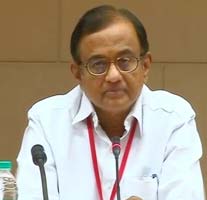New Delhi, July 31: Home Minister P Chidambaram has been shifted to the Finance Ministry vacated by Pranab Mukherjee, who is now President. Sushil Kumar Shinde, who is the power minister, gets Mr Chidambaram's home portfolio and Veerappa Moily, Corporate Affairs Minister, takes additional charge of Mr Shinde's Power Ministry.
A notification on the reallocation of ministries was signed by the President today.
On his new charge as Power Minister, on a day when half the country is reeling under a massive power outage, Mr Moily said, "There are no bad days to take over a job. People need to manage power better. Power shortage is known...a minister can't do all."
This reallocation also comes on a day when the government described inflation levels in the country as unacceptable; Mr Chidambaram has been finance minister before, and his appointment will be seen by many as signaling a shift in policy. The biggest criticism of the UPA 2 government, and the finance ministry under Mr Mukherjee, was what is called its policy paralysis. Mr Chidambaram is seen as pro-reforms.
Much noise, however, can be expected from the opposition benches. The BJP-led opposition has targeted Mr Chidambaram, even boycotting him in Parliament, for what it alleges is his role in the 2G scam. That dates back to 2008, when Mr Chidambaram was finance minister. But in giving him the crucial finance ministry back, the Congress, which leads the UPA government, has also sent out the signal that it backs its man to the hilt.
The Congress also needs to decide and announce, before Parliament meets next week, who will replace Mr Mukherjee as Leader of the Lok Sabha. There has been a demand from some Congressmen that two-term MP Rahul Gandhi be elevated to that role. Congress president Sonia Gandhi is expected to take a decision soon; among those whose names have reportedly been considered is Mr Shinde.
Parliament sits next week for the monsoon session and the government had indicated that before the session began it would fill the important Finance Ministry. The Prime Minister had held interim charge for a little over a month now, but it was clear that the job needed a full-time minister with the economy struggling with slow growth and high inflation.
Mr Shinde has suddenly been the man in the hot seat over the last two days, with the Northern Grid collapsing yesterday, plunging 300 million people in darkness and then three grids - Northern, Eastern and North Eastern - collapsing today, leaving 19 states and 600 million people without power.
As Home Minister, Mr Shinde is likely to confront crises more frequently. Home is a much bigger assignment and comes to him despite the Adarsh scam cloud and a lack lustre performance as power minister. Mr Shinde, apart from being a veteran Congressman, is a prominent Dalit leader. Interestingly, he is the first former sub-inspector to be Home Minister, who heads all law and order.
This exercise is being looked at more as a re-allocation of tasks and a bigger cabinet reshuffle is expected in a couple of months.



Comments
Add new comment